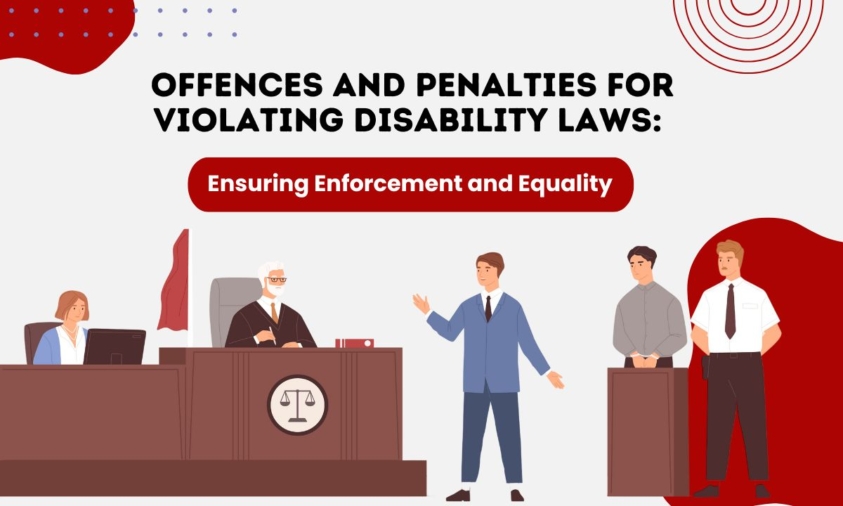Introduction: Disability laws and rules play a crucial role in protecting the rights of individuals with disabilities and ensuring their full inclusion in society. These laws establish a framework that promotes equal opportunities, accessibility, and respect for the dignity of people with disabilities. To uphold these principles, offences and penalties are enforced to deter violations and hold individuals and organizations accountable.
Offenses related to disability laws encompass a wide range of actions that comes in the way of ensuring the rights and well-being of persons with disabilities. Such offences may include intentional insults, intimidation, denial of services or accommodations, physical abuse, or discrimination in employment, education, or public places. These acts create barriers and perpetuate social exclusion, depriving individuals of their fundamental rights. To maintain a fair and inclusive society, it is imperative that these offenses are taken seriously and addressed through appropriate penalties. Below are some of the provisions as per the ACT 2016
Section 89: Punishment for contravention of provisions of Act or rules or regulations made thereunder.
- Any person who contravenes the provisions of this Act or any rule made under it shall be punishable.
- For the first contravention, the punishment is a fine of up to ten thousand rupees.
- For subsequent contraventions, the punishment is a fine of not less than fifty thousand rupees, but it may extend to five lakh rupees.
Section 90: Offences by companies.
- If an offence under this Act is committed by a company, the person in charge of and responsible for the company’s conduct at that time, along with the company itself, will be deemed guilty.
- Such individuals and the company may be proceeded against and punished.
- However, if the person proves that the offence was committed without their knowledge or that they exercised due diligence to prevent it, they may not be held liable for punishment.
- If it is proven that the offence was committed with the consent, connivance, or neglect of any director, manager, secretary, or officer of the company, they will also be deemed guilty and liable for punishment.
Section 91: Punishment for fraudulently availing any benefit meant for persons with benchmark disabilities.
- Whoever fraudulently avails or attempts to avail any benefit meant for persons with benchmark disabilities will be punishable.
- The punishment can be imprisonment for a term of up to two years, a fine of up to one lakh rupees, or both.
Section 92: Punishment for offences of atrocities.
- This section lists various offenses targeting persons with disabilities.
- Offenses include intentional insults or intimidation to humiliate a person with a disability, assault or use of force to dishonor a person with a disability, denial of food or fluids, sexual exploitation of a child or woman with a disability, voluntary injury or damage to a person’s limbs or senses, and unauthorized medical procedures leading to the termination of pregnancy without consent.
- The punishment for these offenses is imprisonment for a term not less than six months but may extend to five years, along with a fine.
Section 93: Punishment for failure to furnish information.
- If a person fails to produce any book, account, document, or furnish any statement, information, or particulars that they are obligated to provide under the Act, order, or direction, they shall be punishable.
- The punishment for this offense is a fine that may extend to twenty-five thousand rupees for each offense.
- In case of continued failure or refusal, there may be an additional fine that may extend to one thousand rupees for each day of continued failure or refusal after the date of the original order imposing the punishment of a fine.
Section 95: Alternative punishments.
- If an act or omission constitutes an offence under both this Act and any other Central or State Act, the offender, upon being found guilty, shall be liable to punishment only under the Act that provides for the greater degree of punishment.
- This provision ensures that the offender receives punishment in accordance with the law that imposes the stricter penalty.
Conclusion: The enforcement of penalties for violating disability laws serves as a crucial deterrent against discrimination and promotes a more inclusive society. By holding individuals and organizations accountable for their actions, these penalties help protect the rights and dignity of people with disabilities. Ultimately, a society that upholds disability laws and respects the rights of all its members fosters equality, diversity, and inclusion for everyone.


 Cart is empty
Cart is empty 
